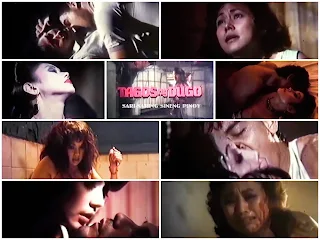Dahas (MAQ Productions Inc., 1995) with Maricel Soriano, has two things that separate it from the pack of thrillers on the shelves: It's almost unbearably tense and it has the biggest visceral kick, capable of inspiring bloodlust in otherwise peaceful viewers. Seeing this movie, about a woman on the run from an abusive husband, makes us want to see Soriano lay him out. To maintain that emotional pitch, it's not enough for a movie to simply show a man smacking a woman. Everything has to work and it does. Chito Roño's cunning direction squeezes every drop of suspense from every setup. Most of all, it's the screenplay by Roy C. Iglesias that transforms an arresting premise into a thriller of significance. Iglesias' most important inspiration was in the writing of Jake, the husband, who is not a routine psycho sprouting devil horns on his honeymoon. Jake (Richard Gomez), operates with an unlimited sense of personal entitlement. He enters the life of Luisa (Soriano), like a toxic Prince Charming, sweeps her off her feet and portrays himself as a rescuer. If Jake were the husband from hell, Dahas would be a monster movie. Instead he's a fellow we recognize, a kind of man we might know, one who prides himself on getting what he wants, whose self-conception is tied up with his willingness to go to any length to succeed. Jakes are everywhere and that alone gives Dahas a modest social importance.
Soriano, playing a damaged soul, conveys a sense of that pain and when Jake hits her for the first time, we feel her terror. Gomez is chillingly twisted and the film is poised to make an effective dramatic statement. Tonton Gutierrez brings an edge to Eric, Luisa's knight in shining armor. Dahas does it by the numbers, albeit with style and has the requisite chase scenes, escapes and near-escapes and a suspenseful finale. Roño uses the same structure, in which a man victimizes a woman for the first half of the film and turns the tables in an extended sequence of graphic violence. The movie, in time-honored horror movie tradition doesn't allow Jake to really be dead the first time. There is a plot twist showing that Luisa can't really kill him--she's the heroine, after all--and then he lurches back into action like the slasher in many an exploitation movie. Dahas has a certain internal logic. Its wife-battering scenes characterize the movie's head-banging aesthetic. Through stealthy camera movements and an abrasively jumpy soundtrack, Dahas does a better job than most movies of sustaining a mood of palpable physical menace, then confirming your worst fears. From this point on, Dahas becomes agonizingly suspenseful and nerve-racking.
Sound Engineering: Audio Post
Production Designer: Jeffrey Jeturian
Supervising Editor: Ever V. Ramos
Film Editor: Jaime B. Davila
Director of Photography: Charlie S. Peralta
Music Composed By: Jessie Lasaten
Screenplay: Roy C. Iglesias
Directed By: Chito Roño










